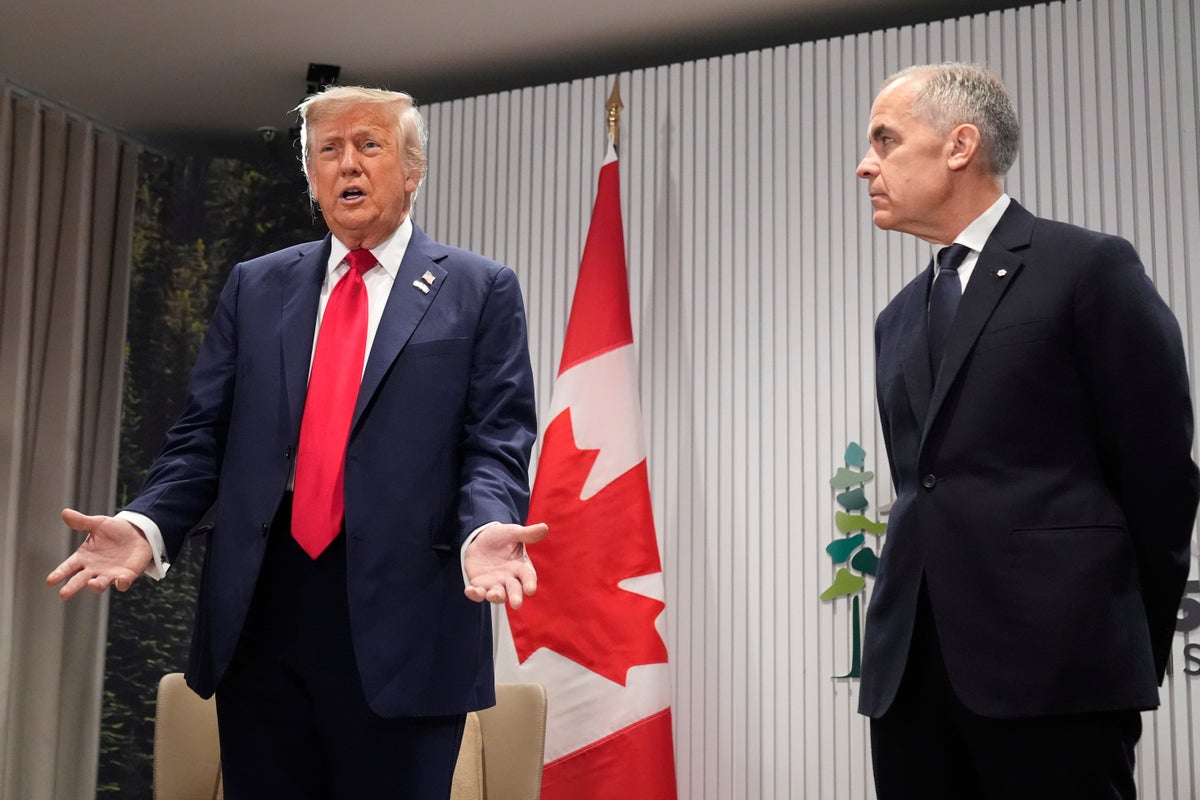President Donald Trump on Friday said he was suspending all trade talks with Canada — and making plans to force Americans to pay high import taxes on its goods — after the northern ally’s finance department confirmed plans to collect a digital services tax.
The late afternoon move quickly caused markets to spiral amid fears of a return to the president’s self-inflicted trade war.
In a post on Truth Social, the president complained that he had “just been informed” about the Canadian government’s decision, which will see it require payment of a 3-percent tax on revenue collected from Canadian users of digital platforms such as Facebook, Instagram and X, above $14.6 million in a calendar year retroactive to 2022.
The tax could saddle American technology companies with bills as large as $2 billion for the first retroactive payments.
Although it is meant to apply to any company that provides digital services and takes in profits from selling advertising or user data, Trump groused that it amounted to Ottawa “putting a Digital Services Tax on our American Technology Companies” and called the move “a direct and blatant attack on our Country.”
“They are obviously copying the European Union, which has done the same thing, and is currently under discussion with us, also,” wrote Trump, who added that the result of the “egregious tax” would be the U.S. “hereby terminating ALL discussions on Trade with Canada, effective immediately.”
The president concluded his post with an unsubstantiated claim that any tariffs on Canadian goods would be paid by the government of Canada (rather than by American importers and consumers), writing: “We will let Canada know the Tariff that they will be paying to do business with the United States of America within the next seven day period.”
A short time later in the Oval Office during a ceremony to mark a peace deal between Rwanda and the Democratic Republic of Congo, Trump claimed the U.S. has “a great relationship with the people of Canada” but groused that the Canadian government has made things “very difficult” even though the U.S. has “all the cards” in the bilateral relationship.
“We don’t want to do anything bad, but … economically … we have such power over Canada. I’d rather not use it, but they did something with our tech companies today, trying to copy Europe,” he said.
He also suggested things “would not work out well for Europe” if the EU continued with plans to implement a similar tax which U.S. tech companies have objected to and described U.S.-E.U. trade negotiations under European Commission President Ursula von der Leyen as “a very tough situation” while repeating an often-used — and false — assertion that the 27-member bloc was formed to “take advantage of the United States.”
“They have been unbelievably bad to us. If you look at past presidents, they’ve treated them very badly. They’re being very nice to me, because I get it. I know the system, and we have the cards. We have the cards far more than they do, and they have not treated us well, and they’re coming to us right now,” he said. He later complained further about E.U. courts with E.U judges imposing fines on American technology companies for violations of E.U. law.
“They’re nasty people, and I don’t want them affecting U.S. companies. I don’t want that — if anybody’s going to affect a U.S. company, I want it to be us, and if they’re going to have to pay a penalty or fine, let it be to us,” he said.
Trump’s threat to punish Canada by taxing Americans comes just weeks after a group of House members wrote to him urging “a swift government response” to any attempt by Canada to collect what they called an “unprecedented, retroactive tax” that would “set a terrible precedent that will have long-lasting impacts on global tax and trade practices.”
“Allowing Canada to proceed with this unprecedented, retroactive tax on U.S. firms would send a signal to the rest of the world that they have the green light to proceed with similar discriminatory cash grabs targeting our firms, workers, and tax base,” they said.
According to the U.S. Trade Representative’s office, U.S. goods trade with Canada totaled roughly $762 billion last year, making Canada one of the country’s two largest trading partners.
Earlier this month, Trump and Canadian Prime Minister Mark Carney announced an agreement to set a July 21 deadline for a new trade agreement at the Group of Seven summit hosted by Carney in Alberta.
Ottawa has been pushing for Washington to stand down from the 50 percent tax currently charged on steel, aluminum and automobile imports as well as other taxes Trump has unilaterally imposed on Americans with the aim of purportedly punishing Canada for not doing enough to stop fentanyl trafficking.
A three-judge panel of the U.S. Court for International Trade had previously ruled that Trump’s use of tariffs for such purposes was illegal but that ruling is on hold pending an appeal.

